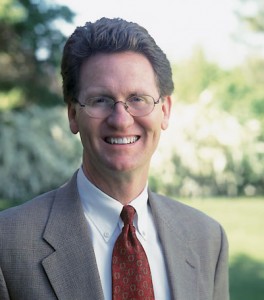By John C. Lewis, ’77
Examining and changing the motives behind the things we do can lead us to God.
I NEED to start with a confession. My wife, Ann, and I are tyrants. We want our three children to play the piano, and we stop just short of shackling their ankles to the bench to make sure that happens.
My firstborn, however, possesses not an ounce of desire to excel at the piano, in spite of years of coaxing and persuasion from his parents. I am counting on his heart softening toward the piano as he matures because he is actually quite talented. I have the feeling that he will go through the same cycle of change that I did, eventually developing a very personal, internal desire to master the piano for the love of music. But, for now, my wife and I accept the fact that he will need steady external motivation if we expect to see any progress.
Why do you do the things you do? Why do you play the piano? Why did you quit playing the piano?
As a freshman at BYU, I remember realizing that I could decide whether or not to get up for church the next morning. Mom and Dad would have no idea whether I went or not. The decision to get up on Sunday morning was strictly up to me, dictated by the internal desires of my heart.
It is really the same with every choice we make. Only we know why we make choices. The more mature and independent we become, the more personal responsibility we have for our choices and the more those choices are governed by the motives within our own hearts. Although external forces will always lean on our behavior, they become more and more subservient to the personal, heartfelt desires we carry inside of us.
President James E. Faust explained:
We must at times search our own souls and discover what we really are. Our real character, much as we would wish, cannot be hidden. It shines from within us transparently. Attempts to deceive others only deceive ourselves. [James E. Faust, “Search Me, O God, and Know My Heart,” Ensign, May 1998, p. 18]
Years ago I heard Elder Boyd K. Packer invite us to listen to our hearts. He didn’t speak of feeling the impulses of our hearts but of listening to our hearts—as if this central organ of our body could actually speak to us.
When warned by the Lamanites that if they prayed to God they would suffer death, “Alma and his people . . . did pour out their hearts to him; and he did know the thoughts of their hearts” (Mosiah 24:12).
So what are the thoughts of your heart? Why do you do what you do?
If I were to poll you right now and ask why you went to church last Sunday—and if you answered honestly from inside yourself—I suspect we would uncover a colorful array of answers reflecting the true “thoughts and intents” within each of our hearts (Mosiah 5:13). You may say because of habit, spiritual refreshment, duty, social outlet, peer pressure, or obedience. We are probably more comfortable with some of the thoughts of our hearts than we are with others. What’s important is to understand them and to know that we can change them if we choose.
Elder Neal A. Maxwell brings the significance of our motives into clearer focus:
Everything depends—initially and finally—on our desires. These shape our thought patterns. Our desires thus precede our deeds and lie at the very cores of our souls, tilting us toward or away from God (see D&C 4:3). God can “educate our desires” (see Joseph F. Smith, Gospel Doctrine, 5th ed., Salt Lake City: Deseret Book Co., 1939, p. 297). [“Swallowed Up in the Will of the Father,” Ensign, November 1995, p. 23]
So then, why did you go to church on Sunday? Why did you sing the hymns? Why did you partake of the sacrament? This process of inspecting and understanding the thoughts of our hearts is difficult to talk about because the subject is so dear and the stakes are so high.
In exploring my own motives, I find they fall across a broad spectrum, bordered on one end by “love of the world” and on the other by “love of God.” Finding validation and reinforcement from the world around us sometimes seems the most intuitive. It is the natural course for the natural man. If being accepted of man is the thought and intent of our heart, we are driven by fashion, winning, money, and power. We may well achieve the acceptance we are looking for, but our satisfaction is built upon sand and soon washes out with the tide. The Lord cautions us repeatedly about going “on in the persuasions of men” and fearing “man more than God” (D&C 3:6, 7).
I am able to tell if my motives tend toward this end of the spectrum if I am primarily worried about me—because, ultimately, chasing after worldliness is to follow a path of systematic selfishness. Selfishly pursuing “the honors of men” (D&C 121:35) shrinks our hearts and removes us from God.
Conversely, our divine nature embraces motives that are compatible with divine attributes. At this end of the spectrum we are driven to act according to God’s will and with a desire to serve Him above all others—because we love Him and we love all that He loves. Instead of being influenced by the voices of men, we take “the Holy Spirit for [our] guide” (D&C 45:57), worrying only about listening closely and intently to His direction in spite of the noisy world around us.
Personal motives at this end of the spectrum are focused on everyone except oneself. There is no time for or interest in worrying about our own gold medal when it feels so good to help someone else to the platform. We embrace the ideal described by the Lord: “Every man seeking the interest of his neighbor, and doing all things with an eye single to the glory of God” (D&C 82:19).
Are the desires of your heart spread across the horizon? Do they motivate you to choices that bring lasting happiness? Are you satisfied with what makes you tick?
As our lives progress, we become increasingly conflicted as we alternate across the spectrum of motives. The Savior’s words make perfect sense: “No man can serve two masters: for either he will hate the one, and love the other; or else he will hold to the one, and despise the other” (Matt. 6:24). With the Lord’s help we can educate the desires of our hearts, eventually resolving the dissonance and ensuring progress toward peace and freedom.
So, how do we do it? How do we have the thoughts of our hearts more regularly speaking the love of God?
After years of wandering about, led by love-of-the-world desires and doing all he could to demonstrate his distaste for God, Alma the Younger experienced a remarkable change of heart. As a result of his experience, he told us:
All mankind . . . must be born again; yea, born of God, changed from their carnal and fallen state, to a state of righteousness, being redeemed of God, becoming his sons and daughters; And thus they become new creatures. [Mosiah 27:25–26]
Spiritual rebirth is the Lord’s way of subduing the natural-man motivations of our hearts and giving life to the divine-nature motivations.
For most of us, spiritual rebirth is not the kind of dramatic event it was for Alma. It is more of an awakening that occurs over a long period of time and preparation. In practical terms it means living the gospel more perfectly each day. It means for a season doing a lot of things because people we trust encourage us to. I lean on Dad’s testimony until I have discovered one of my own. It also means that sometimes we will do the right thing for the wrong reasons. I think that it is better to be in church to see our friends than not to be in church at all and that praying out of habit at least gets us in the right posture to converse with God. As we practice doing the right things—even if for the wrong reasons or because we are responding to pressure from those we love and trust—rebirth commences and the Lord is able to educate our desires. Before long our personal motives grow up to meet our actions.
We need to know the love that God has for us before we can muster the faith to let go of the familiar reinforcement the world offers. It is His love for us that allows the purifying rebirth to occur. We recognize that the prime demonstration of His love is the gift of His Son (see John 3:16). In his powerful description of charity, Mormon admonished us to “pray unto the Father with all the energy of heart, that ye may be filled with this love” (Moro. 7:48). Ask for it, he says, so “that when he shall appear we shall be like him, . . . that we may be purified even as he is pure” (Moro. 7:48).
As our hearts change and become more pure, attraction to the world fades and we wonder why we ever possessed such hollow desires. We become happier, more giving, more at peace.
As we come home to the divine within us, we must do as the children of Israel in the last days: We must exchange stony hearts for soft hearts (see Ezek. 11:19). We must exchange shrunken hearts for expanding hearts. We must exchange spotted hearts for pure hearts. If we can manage this exchange called rebirth and become attuned to the Holy Spirit, we will clearly hear the thoughts of our hearts urging us to love God, and we will make corresponding choices. Those choices will ultimately lead us to God, who has promised us immortality and eternal life.
John C. Lewis is BYU’s associate advancement vice president and the publisher of BYU Magazine. This article is adapted from the March 4, 2003, devotional address “The Thoughts of Our Hearts or Why Do We Do What We Do?” which can be found online in its entirety at speeches.byu.edu/.











